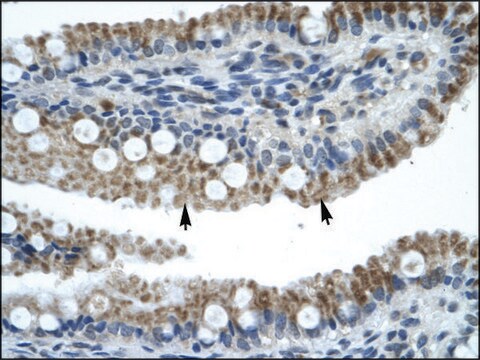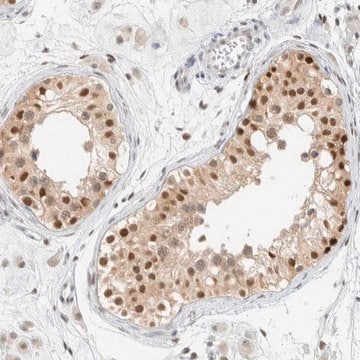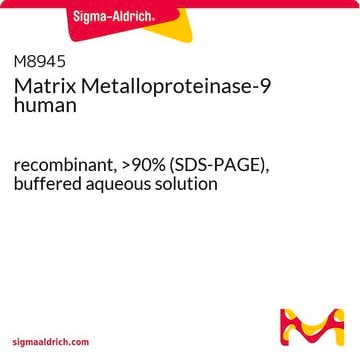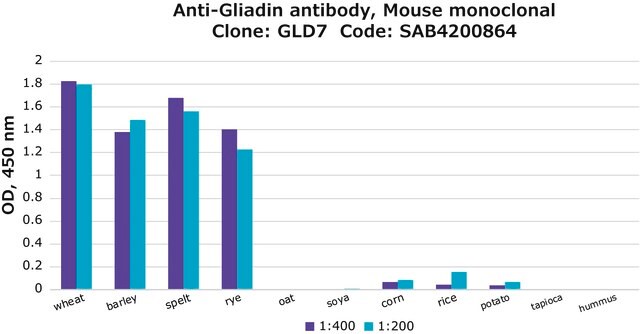一般說明
We are committed to bringing you greener alternative products, which adhere to one or more of The 12 Principles of Green Chemistry.This antibody is Preservative-free, produced without the harm or sacrifice of animals and exceptionally stable to allow for ambient shipping and storage if needed and thus aligns with "Waste Prevention", "Designing Safer Chemicals" and "Design for Energy Efficiency".
Click here for more information.
ZooMAb® antibodies represent an entirely new generation of recombinant monoclonal antibodies.Each ZooMAb® antibody is manufactured using our proprietary recombinant expression system, purified to homogeneity, and precisely dispensed to produce robust and highly reproducible lot-to-lot consistency. Only top-performing clones are released for use by researchers. Each antibody is validated for high specificity and affinity across multiple applications, including its most commonly used application. ZooMAb® antibodies are reliably available and ready to ship when you need them.
特異性
Clone 1N19 is a ZooMAb® Rabbit recombinant monoclonal antibody that specifically detects ZNF683. It targets an epitope within 25 amino acids from the N-terminal region.
免疫原
KLH-conjugated linear peptide corresponding to 25 amino acids from the N-terminal region of human ZNF683.
應用
Quality Control Testing
Evaluated by Western Blotting in Raji cell lysate.
Western Blotting Analysis: A 1:10,000 dilution of this antibody detected ZNF683 in Raji cell lysate.
Tested applications
Western Blotting Analysis: A 1:10,000 dilution from a representative lot detected ZNF683 in NK92 and RAW264.7 cell lysates.
Immunocytochemistry Analysis: A 1:100 dilution from a representative lot detected ZNF683 in Raji cells.
Affinity Binding Assay: A representative lot of this antibody bound ZNF683 peptide with a KD of 4.1 x 10-7 in an affinity binding assay.
Note: Actual optimal working dilutions must be determined by end user as specimens, and experimental conditions may vary with the end user
標靶描述
Tissue-resident T-cell transcription regulator protein ZNF683 (UniProt: Q8IZ20; also known as Homolog of Blimp-1 in T-cell, Hobit, Zinc finger protein 683) is encoded by the ZNF683 gene (Gene ID: 257101) in human. ZNF683 is a transcription factor that mediates a transcriptional program in various innate and adaptive immune tissue-resident lymphocyte T-cell types. Its expression is observed in terminally differentiated CD8+ T cells, natural killer (NK) cells, and natural killer T cells (NKT). It is also reported to be one of the most highly upregulated transcription factor gene during ex vivo differentiation of human CD34+ cord blood progenitor cells to CD56+ natural killer (NK) cells. It negatively regulates gene expression of proteins that promote the egress of tissue-resident T-cell populations from non-lymphoid organs. It also plays a role in the development, retention, and long-term establishment of adaptive and innate tissue-resident lymphocyte T cell types in non-lymphoid organs, including the skin, gut, liver, and kidney. Hence, it can provide immediate immunological protection against reactivating infections or viral reinfection. It has four C2H2-type zinc finger domains that are necessary for its DNA-binding. Two isoforms of ZNF683 have been described that are produced by alternative splicing. Isoform 1 lacks the transcriptional repressor activity and isoform 2 functions as a transcriptional repressor and can regulate IFN- production in cytomegalovirus-infected CD8+ T cells. Knockdown of ZNF683 gene is reported to increase in the proportion of IFN- -producing cells. Both isoforms are known to bind to DNA within promoter regions of the transcriptional repressor PRDM1/BLIMP1 target sites. This ZooMAbZooMAb® recombinant monoclonal antibody, generated by our propriety technology, offers significantly enhanced specificity, affinity, reproducibility, and stability over conventional monoclonals. (Ref.: Post, M., et al. (2017). Front. Immunol. 8; 535; Braga, FAV., et al. (2015). Eur. J. Immunol. 45(10); 2945-2958).
外觀
Purified recombinant rabbit monoclonal antibody IgG, lyophilized in PBS, 5% Trehalose, normal appearance a coarse or translucent resin. The PBS/trehalose components in the ZooMAb formulation can have the appearance of a semi-solid (bead like gel) after lyophilization. This is a normal phenomenon. Please follow the recommended reconstitution procedure in the data sheet to dissolve the semi-solid, bead-like, gel-appearing material. The resulting antibody solution is completely stable and functional as proven by full functional testing. Contains no biocide or preservatives, such as azide, or any animal by-products. Larger pack sizes provided as multiples of 25 μL.
重構
300 μg/mL after reconstitution at 25 μL per vial. Please refer to guidance on suggested starting dilutions and/or titers per application and sample type.
儲存和穩定性
Recommend storage of lyophilized product at 2-8°C; Before reconstitution, micro-centrifuge vials briefly to spin down material to bottom of the vial; Reconstitute each vial by adding 25 μL of filtered lab grade water or PBS; Reconstituted antibodies can be stored at 2-8°C, or -20°C for long term storage. Avoid repeated freeze-thaws.
法律資訊
ZooMAb is a registered trademark of Merck KGaA, Darmstadt, Germany
免責聲明
Unless otherwise stated in our catalog or other company documentation accompanying the product(s), our products are intended for research use only and are not to be used for any other purpose, which includes but is not limited to, unauthorized commercial uses, in vitro diagnostic uses, ex vivo or in vivo therapeutic uses or any type of consumption or application to humans or animals.










